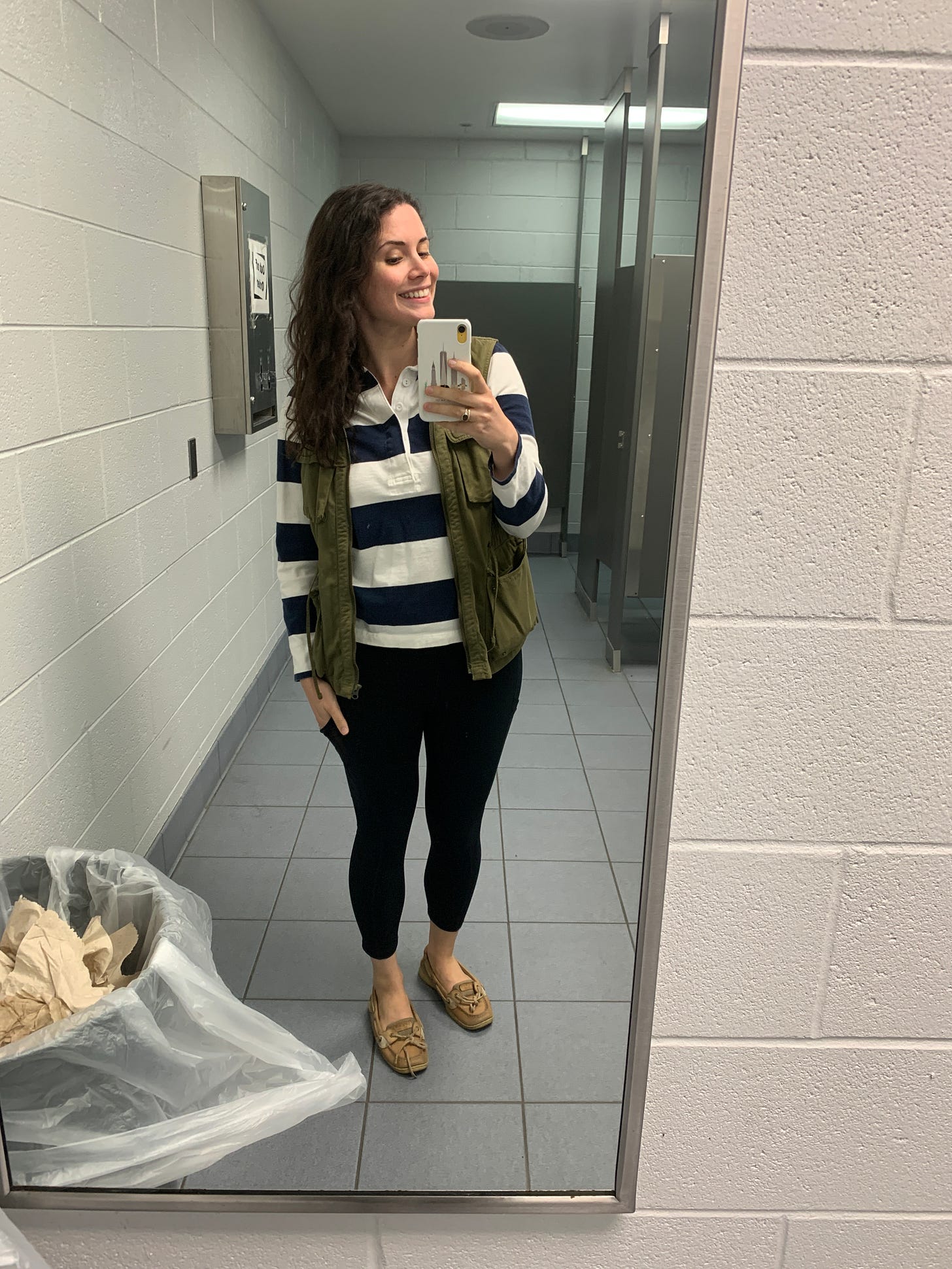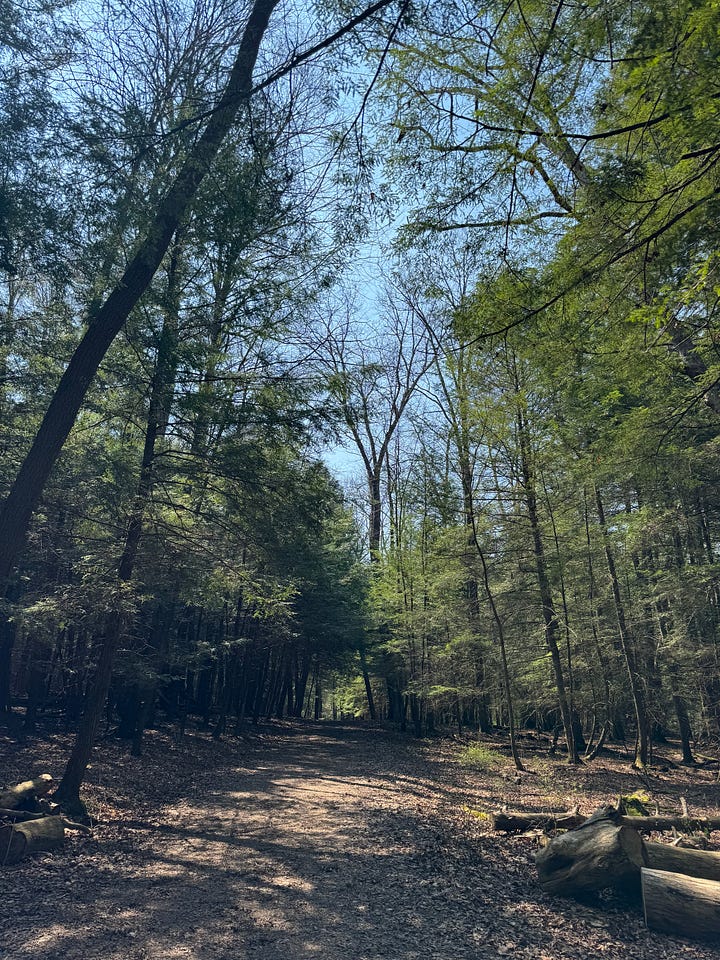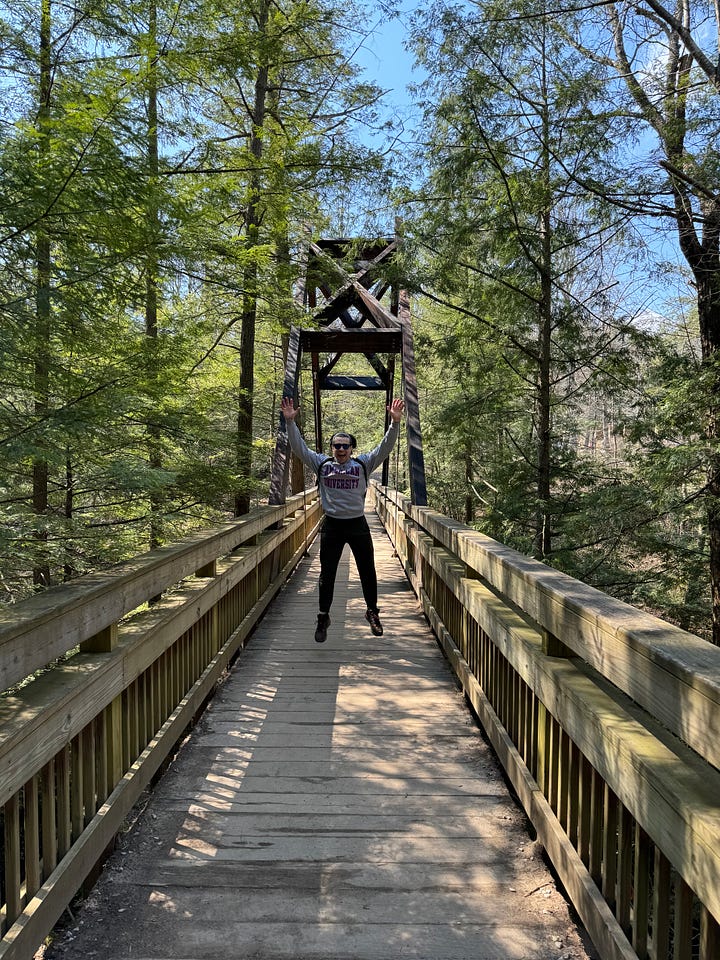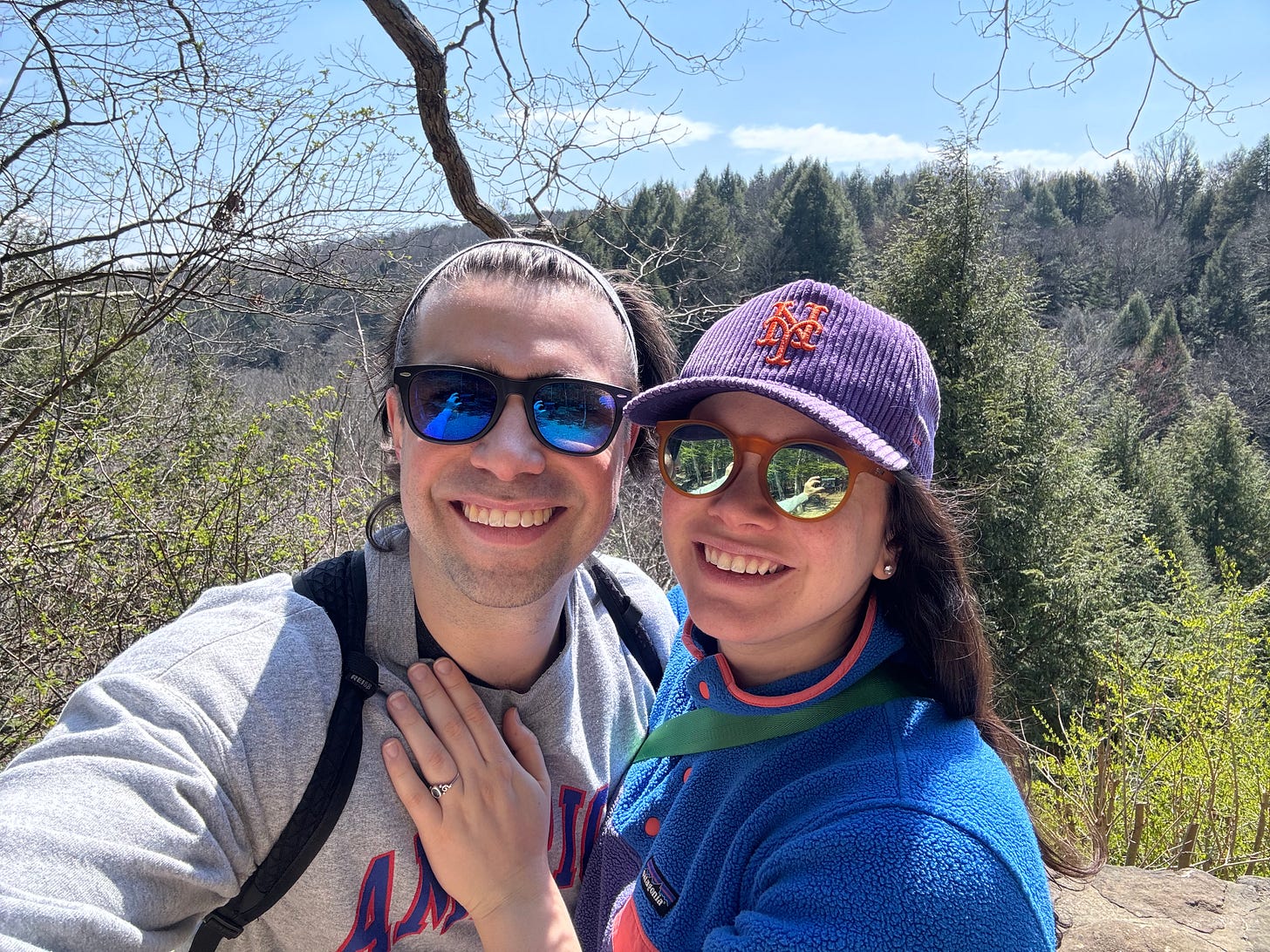OOO #69: Outfits, Ohio, and Other Things I Like
I'm glad I wasn't also wearing my aviators, a new trail, and the best of my reading list
Outfits

Ohio
Last weekend, I went on a hike down in Hocking Hills. I’ve written about how much I like hiking in Hocking Hills already, but this excursion opened me up to new possibilities for hiking in Ohio.
We started at Old Man’s Cave, mostly because of its proximity to the visitors’ center and the encyclopedic vending machines there (when was the last time you saw caramel chews in a vending machine?!). I really do love the waterfalls (a trip to Oregon is likely in the next 2-5 years) at Old Man’s Cave, but apparently, so does everyone in Ohio because there was a massive jam of people on the gorge trail. Like standing still waiting for people to go through certain access points kind of massive jam.
I was not in the mood to wait in line to hike (who is?), so I decided to pivot and try the rim trail (called the Gorge Overlook Trail). I have never noticed the existence of the rim trail until this most recent trip, and I am so thankful I hiked it. Yes, you miss the waterfalls and the bridges and all the other *charm* of the trails in the gorge, but the rim trail was nearly empty and was filled with beautiful trees and gentle inclines. There were a few overlooks too. The trail ultimately ends up at Cedar Falls; I didn’t make it this time, but I will the next time.


Other Things I Like
Since I’m on Spring Break, I’m reading a ton and may have already finished three books. It’s been a while since I’ve shared books I’ve recently enjoyed, so let’s do it.
Stone Blind by Natalie Haynes: A unique book, and not for the faint of heart (although if you know anything about Greek mythology, none of of what happens should surprise you). What intrigued me the most was the absolute casualness of the violence described in the novel; most authors try to impress you with their descriptions of gore, but Haynes is very matter of fact about what happens. Then she makes you feel bad if you don't care the way we should about said violence. It was all very clever. I think overall, it was a very honest book: it is a realistic depiction of human motivations and what I assume Hellenistic god behavior would be.
In Search of Deeper Learning: The Quest to Remake the American High School by Jal Mehta and Sarah Fine: A great book to challenge my pedagogy and consider what great teaching actually entails. It made me want to rethink both of the curricula I’ve worked on in the last few years, as the book identified solutions for the problems I’ve run into; next year, I want to focus more on deeper learning of themes and skills instead of getting through everything I want or "need" to get through. I ended up buying a copy for my friend in ed policy because it’s so good.
Hell Bent by Leigh Bardugo: The second in the Alex Stern series (the first is Ninth House, which I LOVED). Overall, it is an excellent sequel: it is equally as inventive as the first novel, gives its main characters more backstory, and, without giving anything away, it doesn’t take forever for the thing you want to happen to happen (I hate when sequels refuse to resolve the issues from the first book until the absolute last moment). I’m eagerly waiting for the third in the series!
The Millionaire and the Bard: Henry Folger's Obsessive Hunt for Shakespeare's First Folio by Andrea Mays: I’ve mentioned this book before in the context of how much I love the Folger Shakespeare Library, but I want to give it its due on its own. I absolutely adored this book. Mays starts out with an overview of Shakespeare's life and an in-depth discussion of the landscape and process of publishing at the time and how the First Folio came to life. I think it is absolutely beautiful that the First Folio was created because two of the King's Men--John Heminges, Henry Condell, friends and colleagues of Shakespeare--pulled together all of his plays into one book as a way to make sure their friend's great work and memory would be not be forgotten. I also enjoyed getting to know more about Henry and Emily Folger, who worked for decades to build the library's collection, through The Millionaire and the Bard. Learning about them will make my next trip to the Folger even more special now that I understand all of the work that went into creating such a singular and important institution. Mays also does a nice job of highlighting themes of legacy, cultural access, and the impulse of collecting. It was overall a thoughtful work.
The Folk of the Air series by Holly Black: I read ACOTAR but didn’t love it. People are all in on fae fantasy series (or at least that’s what Goodreads wants me to believe), so I decided not to give up after my first experience. I googled “best fae fantasy series” and Holly Black’s name popped up repeatedly. I really enjoyed The Folk of the Air series because the main character is actually flawed and interesting. Most fantasy series (ACOTAR, Twilight, etc.) rely of female characters that are either perfect or so bland that you can project your own personality on them, but Jude is rash, smart, focused on her own goals, and not charming. Also, the book is plot-heavy rather than romance heavy (that’s not to say there is no romance), which I appreciate.
The Daevabad Trilogy by S. A. Chakraborty: I’m always looking for fantasy novels that explore cultures and creatures outside of the Western world, and I found absolute joy in Chakraborty’s Daevabad Trilogy. This trilogy focuses on the magic of djinn, and Chakraborty’s world building is nothing short of magnificent. I don’t want to spoil anything, so I don’t want to discuss the plot, but if you are interested in the Middle East and love fantasy literature, this trilogy is a gem. I particularly liked that Chakraborty included religious and cultural elements from before and after the founding of Islam, and she folded in a lot of social commentary into the way she devised Daevabad’s social structures.
Taste: My Life Through Food by Stanley Tucci: An absolute delight to read. It honestly made me want to pack up and move to Italy with my family for a year... or five (why don’t I do this?).
The Alice Network by Katie Quinn: Women’s contributions to both wars (WWI and WWII) are oft-overlooked, and The Alice Network does a great job of bringing some of their stories to light. I also don’t know enough about what life was like in German-occupied places during either war (particularly in places that were not seeing much combat), and the book illuminates those experiences too. The characters are unforgettable, and I’m still thinking about how good this book is.
Dread Nation by Justina Ireland: I’m not much for zombies usually (mostly because of their misuse in modern culture without any recognition of their historical origin), but Ireland’s exploration of race, colorism, history, legacy, and gender made this YA novel amazing. Jane is a phenomenal main character, and Ireland’s supporting characters are equally rich. Dread Nation is inventive and scary, and it deserves every single accolade it received (and more).
They're Going to Love You by Meg Howrey: I don’t know much about the world of ballet (despite enjoying watching performances), so this book introduced me to a whole new culture and lexicon. It’s a fascinating novel that jumps back and forth through time (a structure I enjoy; The Alice Network and Ninth House are structured similarly) and explores themes of betrayal, unattained dreams, familial alienation, the AIDS crisis, and of course, danse. You know… all very light things.
Old News
Accidentally Wes Anderson gives us a brief history of glass.
I always get these confused, and now I’m 50 percent more confident I’ll remember the difference between a trattoria and osteria.
Duolingo explains the relationship between Arabic, Hebrew, and Persian.
Can someone please invite me to the fruit party?!
That’s it! Have a great rest of your week!




